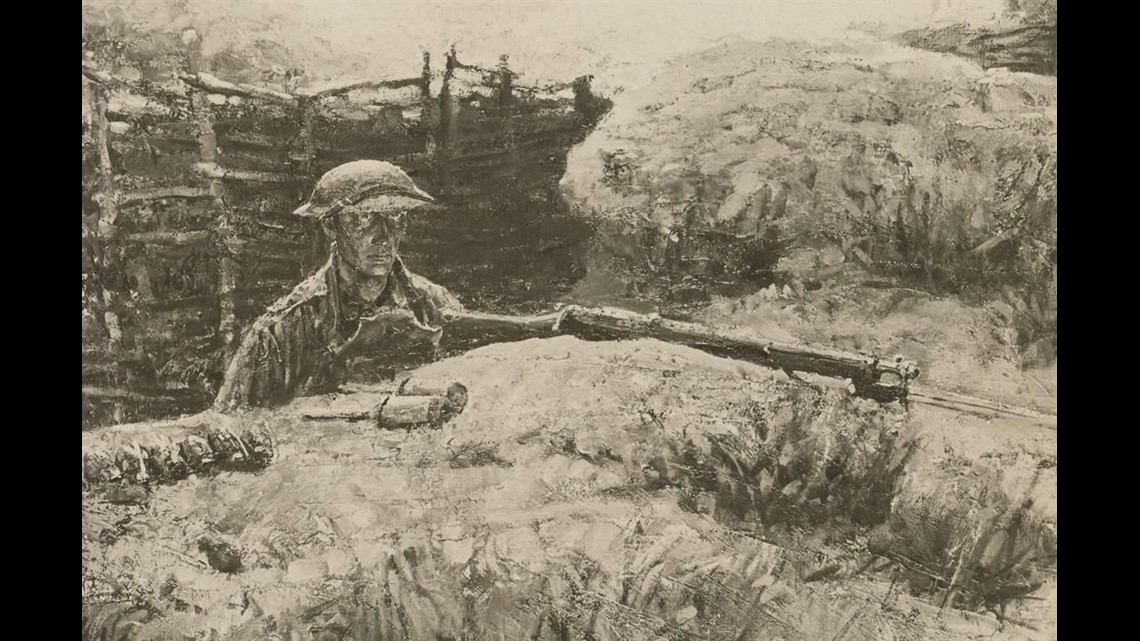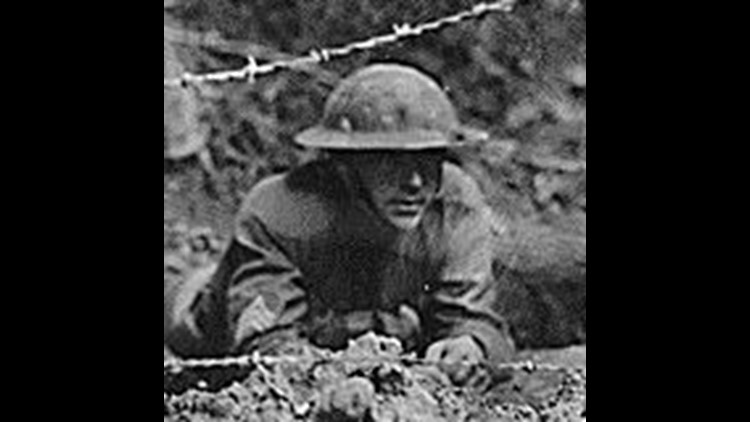

TOLEDO, OH (WTOL) - By the time the United States entered World War I in the spring of 1917, the earth had already been shuddering with the thunder of battle for three years through Europe and on the high seas. Many Americans, but not all, were ready to join the fight against the Kaiser and put an end to the long nightmare of German ambition.
Toledo, like the rest of the country, sent her boys to the front to help in the cause. During this time, the news stories of the day reflect an emboldened American spirit of pride and patriotism and a compliant willingness to sacrifice both blood and treasure.
Toledo did both.
Thousands of dollars of were raised to help fund the war through what were called Liberty Loans and Toledo was one of the top leaders in the country for such fund raising, and likewise, Toledoans also offered thousands of young men to fund the need for human lives on the front lines in France, in what would become a brutal trench war of attrition against the hated Germans.
By the time it was over, it was the costliest war in terms of human life, in the history of humanity. Over 8 million dead. For the United States, 116,000 military troops died in battle or from disease or accidents in the short 19 months of deployment.
Over 400 young men from the Toledo-area would not return home alive, having died on the battlefield, or of disease or by accident.
The Toledo News Bee newspaper at the time was a great repository of war information, reporting daily on the situation at home and abroad. One of the most poignant features I found in the pages of the newspaper were the letters from Toledo "Yanks" serving in France during those months just before the fall of the Germans in November of 1918.
The letters lend a human perspective to the events. A truly American perspective through the eyes of young men, many of whom had never traveled much beyond Lucas County, but whose sensibilities were now transported to a strange new world against the harsh landscape of war that would change their lives forever.
William Kieswetter wrote to his father J.L. Kieswetter of 828 Michigan St.:
"When we landed in France we were shipped in boxcars, they packed us in like sardines. We had to split up and sleep in shifts during the ride at night. The speed of the French trains would make one seasick. One could walk backward twice as fast as we moved forward. We were five hours in going 20 miles."
Private Edward Major wrote to his father F. Major at 1806 Ray St. Toledo.
"I was wounded in the thigh on the morning of November 1st, just after daylight. We were going over the top. As we went over the top, a gang of German machine guns opened fire on us. We jumped into a shell hole and listened to the bullets buzz over our head. Soon it became quiet, so one of the fellows said "let's go," so we started. Started was all. From the minutes we showed ourselves we drew a hornet's nest of machine fire. But this time our fellows kept going. I was one of the lucky ones. I got plugged. But it is not so bad, these hospitals are a great place to get some rest."
J Frank Coveney wrote to his sister Mrs. Stanley Lanker in Point Place:
"Wine, women and song are what Paris lives under. I never saw the likes of it before in all the cities I've been in, both in the United State and over here. We are billeted and set in a small building about 10′ x 12′. It is pretty crowded. This is one of the battlefields and graves are all around us. One grave they say has 10,000 French soldiers in it. A good sized city – isn't it?" Some of the German prisoners are sure bum looking fellows and gaunty. They seem to be glad to be taken. I guess their stomachs are full of war."
For some of the Toledo soldiers, the adventure of war also involved other adventures besides those on the battlefield. Louis Gerding of Toledo wrote to his mother Ann Gerding of 119 Maumee Avenue about his new kindled friendship with a "French girl".
"I've got the best little girl over here. She is teaching me French and I am teaching her English. I sent you her picture about a month ago. If you didn't get it, here's another one. In another month, your son will be able to speak French. Just think of it! We had a party about two weeks ago. I sure had a good time We had all the beer and eats we wanted. We also had a little show and also the band was here, so you see we never get time to get homesick."
The sight of an American soldier, a Yank, with the companionship of a French girl was apparently not an unusual occurrence, so penned, Toledoan David Redding of the Chief Surgeon's office to his father John Redding, who worked for the Wabash railroad and the nephew of Rev. Thomas Redding of Maumee.
"Everywhere..one can see an American soldier with a girl, while the French soldiers walk alone. The American soldiers are the cakes-of-the-walk in the town. I am learning French rapidly. I don't mean I can speak fluently but just can make myself understood."
Corporal Bennie Rosencranz of Toledo wrote to his family that it was candy that was in short supply in France.
"We get all of the tobacco and cigarettes we need and at less than they cost in the United States. Candy is very scarce, however, and when the Y.M.C.A. gets a supply, which is not very often, it lasts about a day."
Other Toledo soldiers wrote of their eagerness to defeat the Germans and come home.
Toledoan Clinton Hart to Mrs. John Holzer of 1230 Oak Street wrote:
"At last we are here and ready to do our best to lick the Kaiser. We are all in fine condition, we were on the boat just 17 days." One cannot judge the beauty of France by these camps, for Army camps in war times are not pleasing to the eye. Only old men and women are to be seen. All of the men who can wear the uniform have gone to war, but the women are making a wonderful showing. They keep the chief industry going, which seems to be the making of wine in this locality. Our long days of drilling are over and now the real show is about to begin. I feel good enough to lick any German that walks and I sure will hand it to him."
Others were even more belligerent in their regard for the Germans.
Shirley C. Matheny of company C to his mother Mrs. J.W. Matheny of 319 12th Street wrote:
"We are over here to lick Germany, all of us in the Army are willing to do that. If we can't make these baby killing, conceited pig-headed Huns crawl and say Kamerad to us then we don't want to come home. They have stopped calling us the contemptible little Yankee army now, we've gone up in the world. They now call us barbarians and they know whenever they are facing Yanks, they had better fight like hell or beat it while the beating is good. It's very simple, get Fritz on the run and keep him running and the war will soon be over."
For many of the young Toledo soldiers deployed to Europe, the experience was one of cultural enlightenment. They were getting the chance to see a world they had only heard of, or read about before.
Many communicated those experiences to their loved ones back home. Carl Hoefflin wrote to his mother Mrs. George Hoefflin of 1919 Hurd Street about his life in France:
"The people surely do live strange over here. They wear wooden shoes. The girls drive three or four horses. The buildings are made of stone and are very pretty. The streets are also beautiful."
Private Geogre Fulkert of 731 Pinewood wrote a letter to his wife and family:
"About 25 of us are living in a sawmill at the present time. Some of the boys are living in hay lofts. There are numerous ancient buildings here. One church is 289 years old. Some of the houses are older than this church. This is one place that indicates what women can do. They go out in the field and pitch hay and they operate street cars and do other things that I thought a woman could not do."
Miss Mary Ges of 137 Steele St. read in a letter from her soldier friend Walter Dieffenbach of his observations of this strange and foreign land.
"It is rather interesting to note that the movie scenes and descriptions of French rural life depict conditions very accurately."The farm houses, barns. sheds, etc that are built around a central court are very picturesque, but the romance of sleeping in the second story of a cowshed, as fell to our lot, is nothing to be enlarged upon from the standpoint of comfort."
And while many of the Toledo Yanks reveled in these new experiences, they were also quick to point out that There is "no place like home".
Ferd Gladieux, a Company B machine gunner of Starr Avenue in East Toledo in writing to his father, George, summed it up this way:
"We boys are all having a good time and all enjoying good health, so there are no kicks coming from any of us. I just got through with my breakfast. It was some breakfast. I had seven eggs. It makes me think of home and it's the one thing Uncle Sam doesn't give us."



